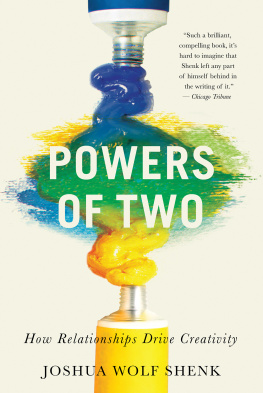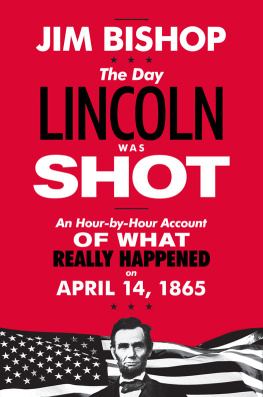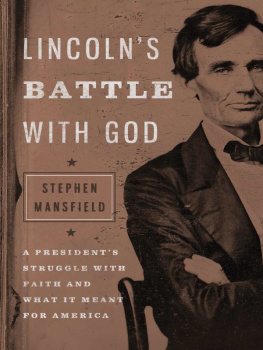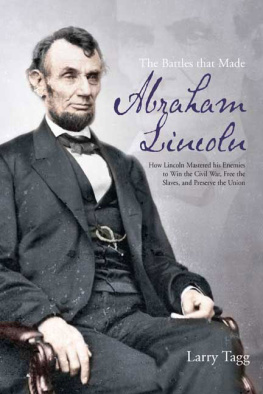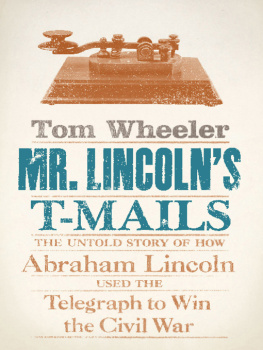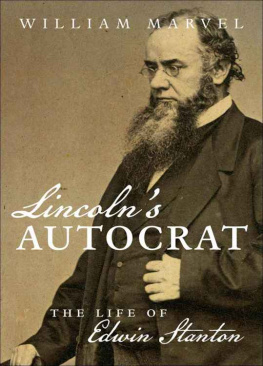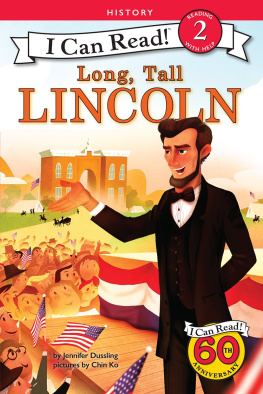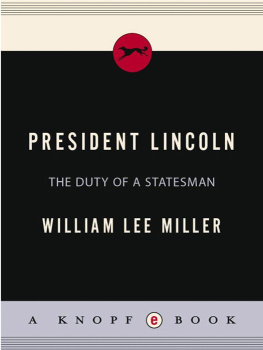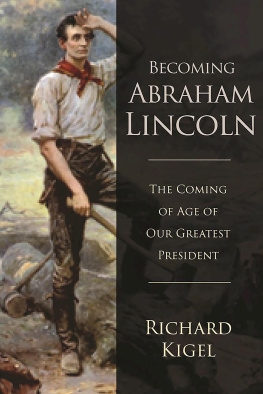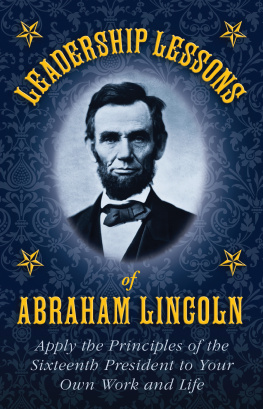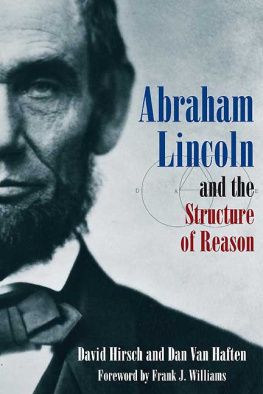First Mariner Books edition 2006
Copyright 2005 by Joshua Wolf Shenk
ALL RIGHTS RESERVED
For information about permission to reproduce selections from this book, write to or to Permissions, Houghton Mifflin Harcourt Publishing Company, 3 Park Avenue, 19th Floor, New York, New York 10016.
www.hmhco.com
Also visit: www.lincolnsmelancholy.com.
The Library of Congress has cataloged the print edition as follows:
Shenk, Joshua Wolf.
Lincolns melancholy : how depression challenged a president and fueled his greatness / Joshua Wolf Shenk.
p. cm.
Includes bibliographical references and index.
ISBN -13: 978-0-618-55116-3
ISBN -10: 0-618-55116-6
1. Lincoln, Abraham, 18091865Psychology. 2. PresidentsUnited StatesBiography. I. Title.
E 457.2. S 47 2005
973.7'092dc22 2005009653
ISBN -13: 978-0-618-77344-2 (pbk.)
ISBN -10: 0-618-77344-4 (pbk.)
e ISBN 978-0-547-52689-8
v4.0915
For Joanne Wolf Cohen and Richard L. Shenk
A Note on the Text
This book is drawn from primary sources, many of which depart from modern standards of punctuation and spelling. Quotations from letters and other period documents are given as in the original.
The inclination to exchange thoughts with one another is probably an original impulse of our nature. If I be in pain I wish to let you know it, and to ask your sympathy and assistance; and my pleasurable emotions also, I wish to communicate to, and share with you.
A BRAHAM L INCOLN , February 11, 1859
Prelude
A YEAR BEFORE HE DIED , Leo Tolstoy told this story to a reporter for the New York World:
Once while travelling in the Caucasus, he said, I happened to be the guest of a Caucasian chief of the Circassians, who, living far away from civilized life in the mountains, had but a fragmentary and childish comprehension of the world and its history. The fingers of civilization had never reached him nor his tribe, and all life beyond his native valleys was a dark mystery.
Tolstoy told them of his work and of the industries, inventions, and schools of the outside world. But only when he turned to the subject of warriors and generals and statesmen did he arouse the interest of his tall, gray-bearded host, the chief. Wait a moment, the chief said. I want all my neighbors and my sons to listen to you.
He soon returned, Tolstoy continued, with a score of wild looking riders and... those sons of the wilderness sat around me on the floor and gazed at me as if hungering for knowledge. I spoke at first of our Czars and of their victories; then I spoke of the greatest military leaders. My talk seemed to impress them deeply. The story of Napoleon was so interesting to them that I had to tell them every detail, as, for instance, how his hands looked, how tall he was, who made his guns and pistols and the color of his horse. It was very difficult to satisfy them and to meet their point of view, but I did my best.
When Tolstoy finished, the chief lifted his hand. But you have not told us a syllable about the greatest general and greatest ruler of the world, he said gravely. We want to know something about him. He was a hero. He spoke with a voice of thunder; he laughed like the sunrise and his deeds were as strong as the rock and as sweet as the fragrance of roses. The angels appeared to his mother and predicted that the son whom she would conceive would become the greatest the stars had ever seen. He was so great that he even forgave the crimes of his greatest enemies and shook brotherly hands with those who had plotted against his life. His name was Lincoln and the country in which he lived is called America, which is so far away that if a youth should journey to reach it he would be an old man when he arrived. Tell us of that man.
Tell us, please, shouted one of the others, and we will present you with the best horse of our stock.
I looked at them, Tolstoy said, and saw their faces all aglow, while their eyes were burning... I told them of Lincoln and his wisdom, of his home life and youth. They asked me ten questions to one which I was able to answer. They wanted to know all about his habits, his influence upon the people and his physical strength. But they were astonished to hear that Lincoln made a sorry figure on a horse and that he lived such a simple life.
After telling them all he knew, Tolstoy said that he thought he could procure a photograph of Lincoln. He rode off to the nearest town, accompanied by one of the young riders. He found a photograph and gave it to him.
It was interesting, Tolstoy said, to witness the gravity of his face and the trembling of his hands when he received my present. He gazed for several minutes silently, like one in a reverent prayer: his eyes filled with tears. He was deeply touched and I asked him why he became so sad.
The young man answered with a question of his own. Dont you find, he said, judging from his picture, that his eyes are full of tears and that his lips are sad with a secret sorrow?
Introduction
I N EARLY MAY 1860, a week before the Republican party held its national convention in Chicago, the delegates from Illinois met in Decatur, a small town in the center of the state. They met in what they called a wigwam, a kind of urban barn, built over a vacant lot with a canvas roof held up by wood beams. When the Decatur convention opened, on May 9, three thousand men packed inside. After an initial round of huzzahs, at the start of the afternoon session, a thirty-five-year-old politician named Richard Oglesby took the stage. I am informed, he said, that a distinguished citizen of Illinois, and one who Illinois will ever delight to honor, is present and I wish to move that this body invite him to a seat on the stand. The crowd waited to hear the mans name, but Oglesby pausedas though, observed a man in the crowd, to tease expectation to the verge of desperation.
At that moment, Abraham Lincoln was crouched on his heels at the back of the hall, just inside the entrance. A fifty-one-year-old lawyer and a veteran of the state legislature, Lincoln had left his last political office, as U.S. representative, eleven years before. After one middling term in Congress, he mostly stayed away from politics for five years. Then, in 1854, an old debate over slavery took a new turn with the repeal of the Missouri Compromise, which, Lincoln wrote, aroused me again. Pressing his argument against the extension of slavery, and for its eventual extinction, he helped build the new Republican party in Illinois. In 1858, he challenged Stephen Douglas for his Senate seat, losing the race but gaining a national reputation from the campaign debates. In February 1860, he dazzled a crowd at New York Citys Cooper Union with an antislavery speech the New York Tribune called among the most convincing political arguments ever made in this city.
Lincoln came to the Decatur convention in May as a rising star. When Oglesby called his name from the stage of the wigwam, the delegates and onlookers broke into thunderous applause. A half-dozen men seized Lincoln and tried to push him to the front of the room. When that didnt workthe room was too fullthey lifted him up on their shoulders and passed him, not unlike in a mosh pit today, over the mass of people to the stage. The crowd roared its approval.
Still, those in the wigwam knew that Lincoln stood a slim chance to take the national nomination the following week at Chicago. Most Republicans expected that the honor would fall to Senator William Seward, the partys leading man. Lincoln, by contrast, failed to rate a mention on preconvention scorecards of seven, twelve, even twenty-one candidates. Lincoln couldnt even count on the backing of his own state convention at Decatur, which he badly wanted. I am not in a position where it would hurt much for me to not be nominated on the national ticket, he wrote, but I am where it would hurt some for me to not get the Illinois delegates.
Next page
